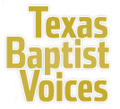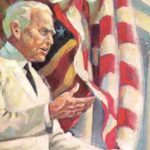In my previous article, I wrote about the Baptist distinctive of religious liberty and the effect it had on me as I transitioned into the denomination. One would be hard-pressed to overstate the importance of the fight for religious liberty in Baptist history or the contributions made by Baptists in this field.
 Jake RaabeBaptists were born out of religious persecution and found themselves unified from the beginning by the pursuit of freedom of religion. In America, Baptists stood at the forefront of the movement for separation of church and state, from Roger Williams decrying state-mandated religion to the Danbury Baptist Association’s correspondence with Thomas Jefferson invoking the first use of the phrase “a wall of separation between church and state.”
Jake RaabeBaptists were born out of religious persecution and found themselves unified from the beginning by the pursuit of freedom of religion. In America, Baptists stood at the forefront of the movement for separation of church and state, from Roger Williams decrying state-mandated religion to the Danbury Baptist Association’s correspondence with Thomas Jefferson invoking the first use of the phrase “a wall of separation between church and state.”
Needless to say, the contributions made by Baptists to religious freedom across the world comprise one of my favorite aspects of being part of the denomination.
Lost sensibility for freedom
After I wrote about this in my last piece, a Methodist friend remarked that, while he recognized that Baptists historically were proponents of freedom of religion, modern Baptists largely have lost this sensibility. Sadly, I think he’s right. Although individual groups like the Baptist Join Committee for Religious Liberty do great work in preserving freedom of religion, Baptist leaders and laity largely have ignored or even unintentionally threatened the cause.
 One such way we harm the cause of religious liberty is by failing to defend the rights of religious minorities.
One such way we harm the cause of religious liberty is by failing to defend the rights of religious minorities.
This election cycle has been a hard one for Muslims in particular, with major political figures calling for banning Muslims from entering the country and for increased policing of primarily Muslim neighborhoods. The idea that the government should treat one religion differently than others should be unthinkable to Baptists, who once were that scrutinized, singled-out group in 17th century England.
And yet prominent Baptists such as Franklin Graham and Robert Jeffress publicly declared support for these singling-out policies. Let us not forget that, in addition to giving in to fear and panic, these policies would set a dangerous precedent for the government treating various religions differently.
All-or-nothing
Sign up for our weekly edition and get all our headlines in your inbox on Thursdays
Religious liberty inherently is all-or-nothing. When we as Christians allow and encourage the denial of freedom of religion to one group, we are being unfaithful to our historical situation—Baptists especially—and setting a precedent that one day will be invoked against us as well.
This is not to say only conservatives are creating problems for religious liberty. In navigating the current tension between civil liberties and exemptions for religious objections, many progressives have not exercised the incredible delicacy required for this task.
A deeply problematic report from the U.S. Commission on Civil Rights, a bipartisan organization, has suggested when civil rights and religious freedom conflict—as, for example, in the various cases of Christian business refusing to provide services for same-sex weddings—religious liberty must be subsumed to civil rights. Regardless of one’s position on how Christian businesses should handle moral objections (A recent Pew study shows Americans are evenly divided on this issue.), the precedent here is dangerous: Religious freedom, according to this line of thought, is not absolute and inalienable, but contingent upon other prior rights.
The question of the relationship between civil liberties and religious freedom is difficult and needs to be worked through carefully. Claiming one set of concerns must always override another is not the way to do this.
Attack from both sides
Religious liberty is under attack from both sides because contemporary America has deconstructed it and separated components that only work together. The right too often appears to want religious preference more than religious liberty, often railing against the concept of separation of church and state while seeking to maintain the ability to act according to religious principles. The left often seeks to preserve the distinction between church and state while failing to make room from religious objections to larger societal movements.
To oversimplify, one side wants free religious exercise without separation of church and state, while the other wants separation of church without sufficient consideration of exercising religious freedoms. One cannot exist without the other. The founders of both our nation and the Baptist denomination realized and lived this.
Maintaining religious liberty in a multi-cultural society is both difficult and necessary. It takes dialogue and communication from both sides of the political spectrum. Because of this, seeking to maintain and protect religious liberty has the potential to unify Baptists in a context in which we increasingly are divided.
Rediscovering our roots through the preservation of religious liberty may just help us remember that we are, ultimately, all parts of one single body.
Jake Raabe is a student at Baylor University’s George W. Truett Theological Seminary in Waco, Texas.















We seek to connect God’s story and God’s people around the world. To learn more about God’s story, click here.
Send comments and feedback to Eric Black, our editor. For comments to be published, please specify “letter to the editor.” Maximum length for publication is 300 words.